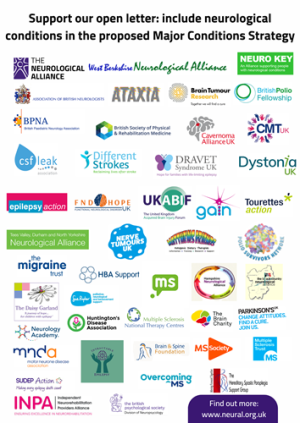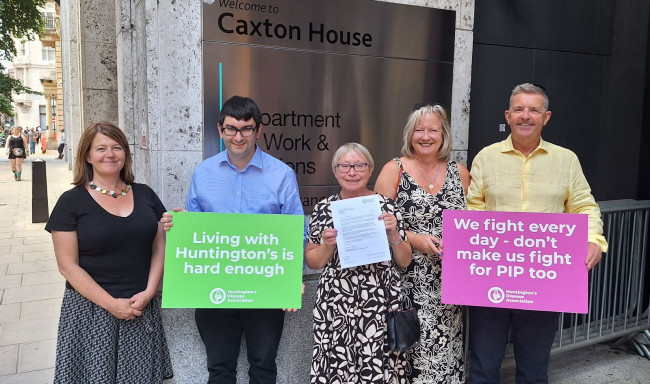44 organisations from across England are today urging the Secretary of State for Health and Care, Stephen Barclay, not to leave the one in six people affected by neurological conditions behind, and make sure they are included as part of the forthcoming Major Conditions Strategy.
The Neurological Alliance – a leading coalition of over 90 organisations working to transform quality of life for people with neurological conditions – coordinated the open letter to the Secretary of State.
Just three neurological conditions mentioned
Despite their prevalence, the Government’s statement announcing the Major Conditions Strategy mentioned just three neurological conditions – dementia, cancer and stroke. This is a significant limitation, the letter argues, as neurological conditions affect millions of people in England and have a significant impact on quality of life, personal independence and our economy.
Neurological conditions are too often overlooked by the government, the letter states, despite being the leading cause of disability worldwide[1] and the second leading cause of death globally, accounting for approximately 9 million deaths per year[2]. The global toll of neurological conditions now exceeds that of all other diseases. As global populations continue to grow and age, the impact is set to increase. In 2020, the total cost of neurological disorders in Europe was $1.06 trillion, equivalent to the cost of heart diseases, cancer and diabetes combined.
The letter also notes that many of the conditions mentioned in the Secretary of State’s announcement, namely cancers, dementia and mental ill health intersect closely with neurological conditions. For example:
The likelihood of having a co-morbid mental health condition is high for people living with a neurological condition, and mental, emotional and cognitive health problems are often caused by physical damage to the brain or atypical biological characteristics within the brain.
Brain tumours are the biggest cancer killer of children and adults under 40, and women with the neurological condition neurofibromatosis type 1 have an increased risk of breast cancer.
Around three in 10 people with Parkinson’s have Parkinson’s-related dementia at any one time.
The letter includes a request for a meeting with the Secretary of State and for the inclusion of neurological conditions in the proposed Major Conditions Strategy.
The impacts of neurological conditions are clear, but the strategy to tackle them is not.
Georgina Carr, Chief Executive, The Neurological Alliance, said:
“The individual, societal and economic impacts of neurological conditions like epilepsy and migraine are painfully clear, but the Government’s strategy to tackle them is not. It is high time Government backed the one in six, and showed their commitment to improving treatment, care and support for people affected by neurological conditions. The Major Conditions Strategy could be a golden opportunity to improve the quality of life for millions of people, by ensuring it sets out an ambitious vision to reduce the impact of neurological conditions now and in the future. We and our members urge Government to ensure the strategy works for people affected by neurological conditions, and stand ready to input.”
Trishna Bharadia, who lives with multiple sclerosis (MS), said:
“As someone living with multiple sclerosis for the past 15 years and who has friends and family members affected by this and other neurological conditions, I know first-hand the impact that such conditions have on people’s lives, work, relationships and wellbeing. It can be severe, long-lasting and have a hugely detrimental effect on the quality of life of people living these conditions and their caregivers.
“The government has the opportunity through including neurological conditions as part of the Major Conditions Strategy, to improve the lives of the millions of us who are directly impacted. It is an opportunity that should not be missed.”
Dr Arani Nitkunan, Consultant Neurologist and trustee of the Neurological Alliance, said:
“My colleagues and I see the devastating impact neurological conditions can have every day. Despite our best efforts to provide the best support for everyone, we are overstretched and overlooked by commissioners. Ensuring neurological conditions are tackled as part of the Major Conditions strategy would help us go further, and mean that people with neurological conditions and services like mine are listened to at the highest forms of Government.”
The letter was signed by these organisations:





